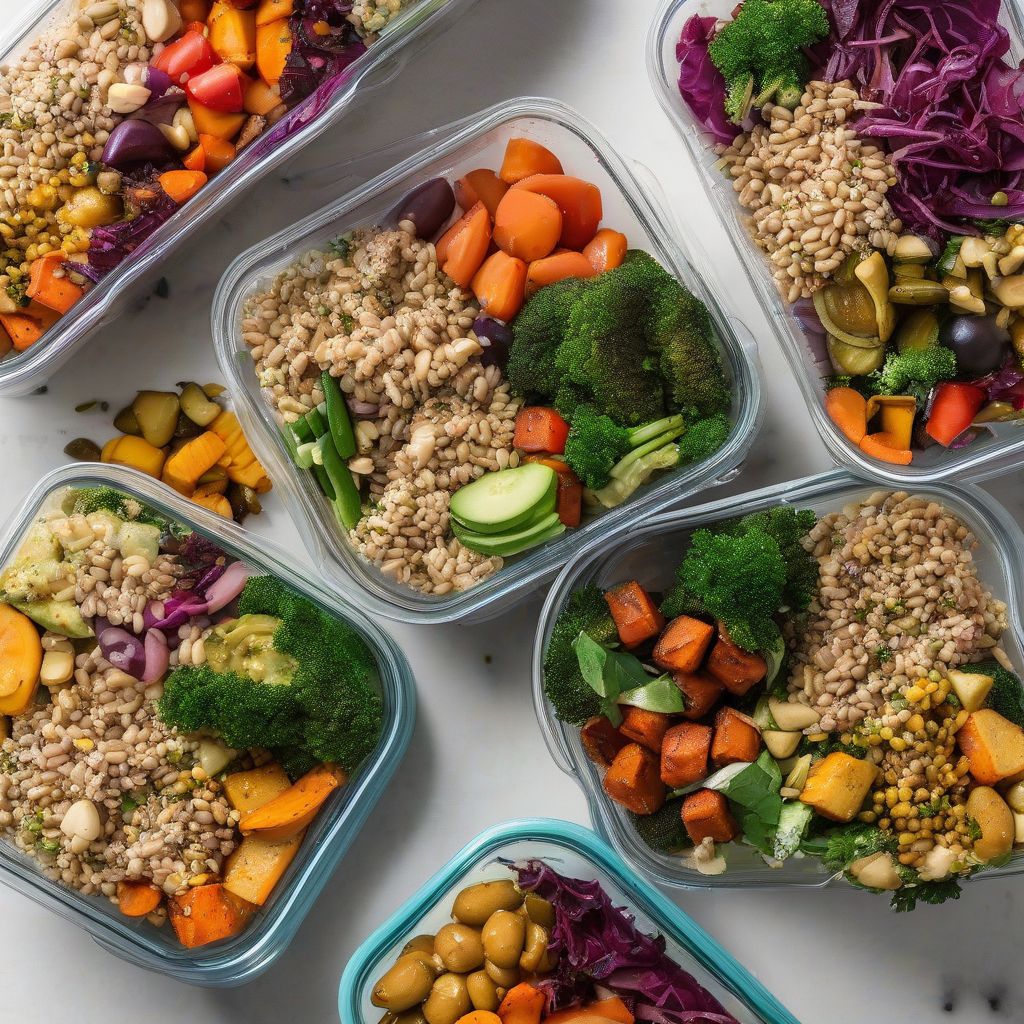So, you’ve decided to embrace the plant-based lifestyle! Congratulations on taking this exciting step towards a healthier and more compassionate way of living. As a nutritionist and meal prep coach, I’ve witnessed firsthand the incredible benefits of adopting a plant-based diet. But I also understand that transitioning to a completely new way of eating can feel overwhelming, especially at the beginning. That’s where the magic of meal planning comes in!
Why Meal Planning is Your Plant-Based Secret Weapon
Imagine this: you open the fridge after a long day, only to find yourself staring at a half-empty carton of almond milk and a wilting head of lettuce. We’ve all been there. This scenario is a recipe for takeout menus and derailing your healthy eating goals. Meal planning helps you avoid these pitfalls by providing a clear roadmap for your meals and snacks throughout the week.
1. Prevents Decision Fatigue
Let’s face it, making constant food choices can be exhausting. By planning your meals in advance, you eliminate the mental gymnastics of figuring out what to eat at every mealtime. This newfound freedom allows you to focus your energy on other important aspects of your life.
2. Ensures Nutritional Balance
One common concern for new plant-based eaters is ensuring they’re getting all the essential nutrients their body needs. Meal planning allows you to create balanced meals that incorporate a variety of fruits, vegetables, whole grains, legumes, nuts, and seeds, providing a spectrum of vitamins, minerals, and antioxidants.
3. Supercharges Your Grocery Shopping
No more aimless wandering through the grocery store aisles! With a well-structured meal plan and a detailed shopping list in hand, you’ll breeze through your shopping trips and avoid impulse purchases (goodbye, tempting vegan ice cream aisle!).
4. Minimizes Food Waste
Did you know that a significant amount of food goes to waste each year? Meal planning helps you become a more conscious consumer by allowing you to buy only what you need, reducing food waste and saving you money.
5. Saves Time and Energy
Imagine this: it’s a Wednesday night, you’re tired, and the thought of chopping vegetables feels like a Herculean task. But wait! You already prepped your ingredients on Sunday, so dinner is just a quick stir-fry away. That’s the beauty of meal prepping – it frees up your valuable time during the week.
 Plant-Based Meal Prep
Plant-Based Meal Prep
How to Master Plant-Based Meal Planning: 7 Simple Steps
Don’t worry, becoming a meal prep master doesn’t require a culinary degree or hours of slaving away in the kitchen. Here are seven easy steps to get you started:
- Start Small: Don’t feel pressured to plan every single meal right from the start. Begin by planning just a few days’ worth of meals and gradually work your way up to the entire week as you gain confidence.
- Find Your Recipe Inspiration: Explore plant-based cookbooks, browse online recipe blogs, or check out social media for culinary inspiration. Pinterest and Instagram are treasure troves of delicious and visually appealing plant-based meal ideas.
- Choose Recipes that Excite You: Let’s be honest, if you don’t enjoy the food you’re preparing, you’re less likely to stick with your meal plan. Select recipes that genuinely appeal to your taste buds and dietary preferences.
- Create a Weekly Meal Plan Template: Keep your meal plan organized and accessible by using a planner, whiteboard, or even a simple spreadsheet. Divide your template into breakfast, lunch, dinner, and snacks.
- Make a Detailed Grocery List: Once you’ve finalized your recipes, create a comprehensive grocery list categorized by food groups. This will prevent you from making unnecessary trips to the store and ensure you have everything you need on hand.
- Schedule a Dedicated Prep Day: Set aside a few hours each week to batch cook grains, roast vegetables, chop fruits, and prepare components of your meals in advance. This will make assembling your meals throughout the week a breeze.
- Don’t Be Afraid to Experiment: Meal planning is all about finding what works best for you. Don’t be afraid to try new recipes, experiment with different cuisines, and adjust your plan as needed.
Essential Tips for Plant-Based Beginners
- Focus on Whole Foods: Center your meals around whole, unprocessed plant-based foods like fruits, vegetables, legumes, whole grains, nuts, and seeds.
- Get Enough Protein: Incorporate plant-based protein sources into your meals, such as tofu, tempeh, lentils, beans, quinoa, and edamame.
- Don’t Forget About Iron: Iron is essential for healthy blood cells. Include iron-rich foods like lentils, spinach, chickpeas, and fortified cereals in your diet.
- Boost Your B12 Intake: Vitamin B12 is primarily found in animal products. As a plant-based eater, it’s crucial to include fortified foods like plant-based milk, nutritional yeast, or a B12 supplement in your diet.
Embrace the Joy of Plant-Based Eating
Transitioning to a plant-based lifestyle is a wonderful journey of exploration and discovery. By embracing the power of meal planning, you’ll set yourself up for success, enjoy delicious and nutritious meals, and experience the incredible health benefits of plant-based eating.
Remember, every step you take towards a healthier lifestyle is a victory worth celebrating. So, go ahead and embark on your plant-based adventure with confidence and a well-stocked fridge!
Resources to Fuel Your Plant-Based Journey
[amazon bestseller=”plant-based cookbook”]
